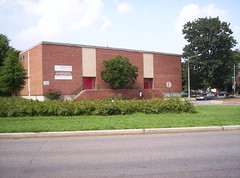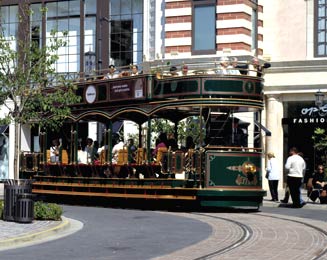City for Sale...

The Examiner, in "Air rights’ idea gets lukewarm response" and the Washington Post blog, in "Are Developers Running the City?" report on yesterday's Council hearing on Bill16-567, which calls for the active inventoring and readying for sale of air rights of DC Government-owned buildings and sites. The justification for this is that the city doesn't have enough money to maintain and/or improve properties.
The Examiner headline on the Front page, "Cropp’s school proposal gets cool reception," indicates that the hearing didn't go over well, while the Postblog sounds as if Chairman Cropp was more focused on making things hunky dory for developers, and less focused on the ramifications of selling off the city, unlike some of those that testified. From the Postblog:
The sharp exchange, between the social worker and the D.C. Council chairman, came toward the end of a council hearing yesterday and lasted about 10 minutes. But it woke up the room and neatly distilled one of the complicated debates about gentrification in the District.
"The developers are the ones that run this city," said Crystal Sylvia, a 35-year-old social worker at Deal Junior High School, testifying about a proposal that would allow developers to buy or lease some public property or build above or below city land. The proceeds would be used to improve public facilities, according to the city council.
Sylvia sees it as the latest in a string of "giveaways" to the private sector - in addition to the D.C. Convention Center and the new baseball stadium - while city leaders ignore municipal needs such as schools, libraries and affordable housing.
"What the council is trying to do is get money to pay for those things," said council chairman Linda W. Cropp, (D), who is sponsoring the bill, which she agreed needs some heavy reworking. "I'm not buying it," Sylvia said. "A lot of people aren't buying it. You may surround yourself with people who are buying it, but a lot of people aren't."
"You may not like it, but this is a tourist town," Cropp said. "A tourist town needs a convention center. A convention center brings in a whole lot of revenue. People go to hotels, they take cabs and that provides jobs for cab drivers. They use the flowers. Look at the budget. See where we get the money. A lot of it comes from business."
 Hine School, across the street from the Eastern Market Metro, is likely looked upon by developers as a great potential redevelopment site.
Hine School, across the street from the Eastern Market Metro, is likely looked upon by developers as a great potential redevelopment site.I'm fine that DC is a tourist town, but tourism can be authentic experiences or what some people derisively refer to as "Urban Disneyland," which is best illustrated by "The Grove" development in Los Angeles, with its own, one-block-long trolley from Boston... This is sanitized space free of grit and foundation.
 Grove Trolley, Los Angeles.
Grove Trolley, Los Angeles.Note to city officials -- you can rollover on the "tourist offer" or you can shape it. Few attendees of events at the Convention Center spend much in the area around it. Although restaurants and hotels do pretty well for events with out-of-area attendance. See Space Available: The Realities of Convention Centers as Economic Development Strategy, a report from the Brookings Institution.
But the best way to sell the city is to ensure that its best assets -- the architecture, history, culture, and people of the city -- are burnished, shined, and developed.
I have written about this so much that I won't repeat myself. I will say that these blog entries cover the argument well enough:
-- more about cultural assets and revitalization
-- Central Library Planning efforts and the City Museum, how about some learning from Augusta, Maine ... and Baltimore?
-- Who ♥ DC? -- More about DC tourism
-- Civic Tourism
-- Town-City branding or 'We are all destination managers now'
and I am leaving tomorrow for the national Civic Tourism conference on these very same issues. (Since it seems as if my new laptop won't be arriving on time, I may be offline for a few days...)
Note that I keep stating that the city doesn't have a Tourism Development and Management plan as part of the Comprehensive Plan and that the Cultural Resources element of the draft Comprehensive Plan doesn't really focus on management and development of cultural assets. The same goes for arts uses.
Too often, the way that the city government deals with any of these issues is an ad-hoc unsystematic manner.
Selling off air rights is a similar ad-hoc effort. Why can't the city have one, open, testable, and transparent way for dealing with public assets?
Something's seriously wrong when so many of the city's processes and "systems" are unstructured and ad-hoc.
Contact EmpowerDC for more information on the Peoples Property Campaign.
Index Keywords: public-assets



0 Comments:
Post a Comment
<< Home